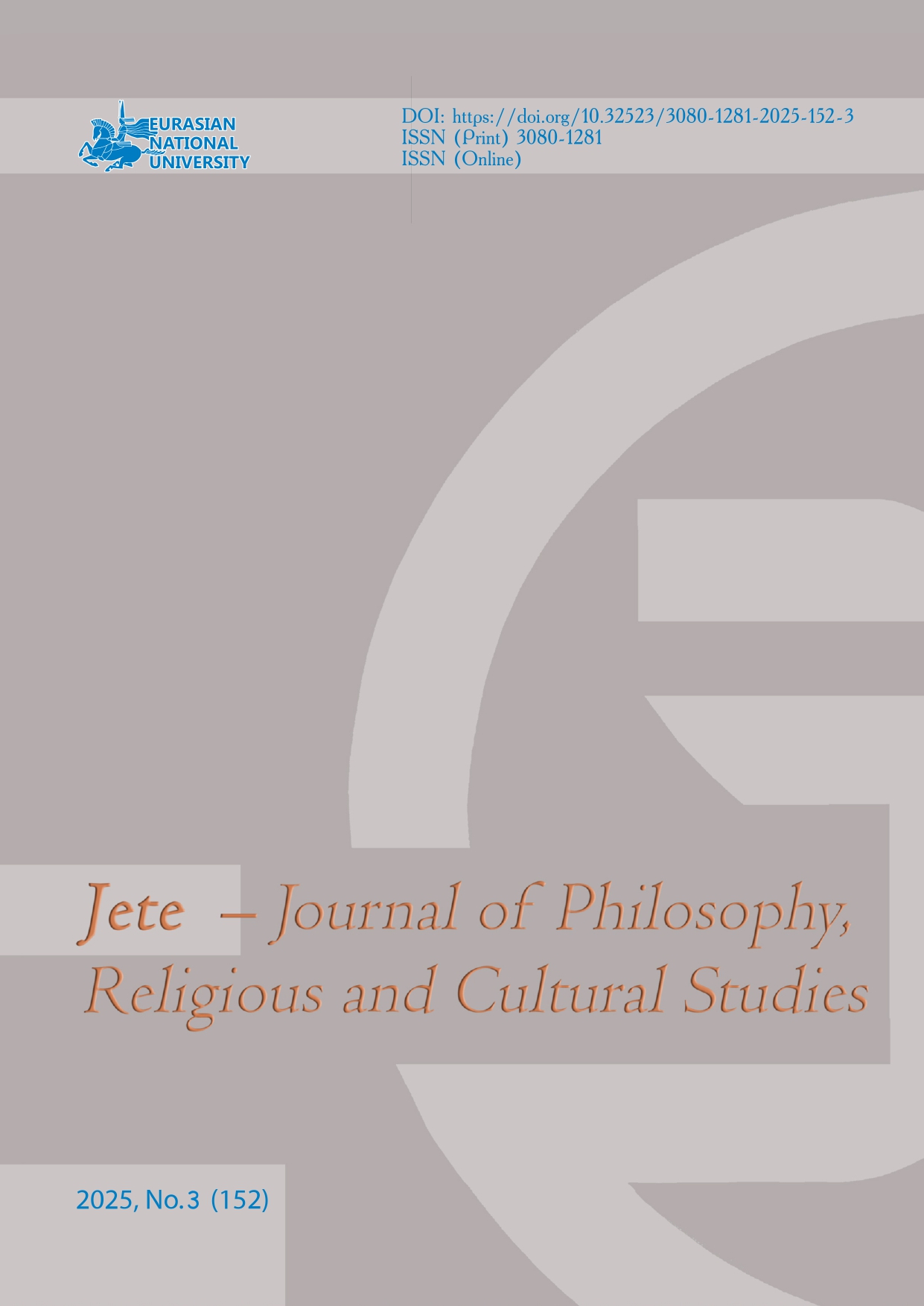«SAYAT QORA» («HUNTING-BOX») AS A HISTORICAL AND CULTURAL VALUE: ISSUES OF SOLITUDE AND FREEDOM
Ғылыми мақала
Views: 157 / PDF downloads: 157DOI:
https://doi.org/10.32523/3080-1281-2025-152-3-19-36Keywords:
«Sayat Qora» («Hunting-box»), existentialism, anxiety, loneliness, stand apart, not lose yourself, fundamental freedom, personal liability, eternity, global problemsAbstract
During the peak of his spiritual and intellectual development, Shakarim deliberately sought solitude, distancing himself from societal bustle. He settled in a remote mountain valley, where he established «Sayat Qora» – a place that became a symbol of his spiritual quest. This conscious withdrawal from the world reflected his pursuit of inner freedom and harmony.The phenomenon of Shakarim’s seclusion has yet to receive adequate philosophical reflection within the framework of Kazakh intellectual tradition. Just as Tolstoy’s Yasnaya Polyana and Abai’s Zhidebai have become sacred spaces in Russian and Kazakh cultural history, respectively, Shakarim’s «Sayat Qora» also represents a unique spiritual value. It is a space that embodies his worldview, personal search, and philosophical depth. Shakarim was an outstanding thinker, a classic poet of Kazakh literature, a historian, and a humanist. His life was marked by profound complexity. Interpreting the phenomenon of Shakarim through the prism of the sacred space of «Sayat Qora» provides a new perspective on the themes of solitude, freedom, and spiritual autonomy, which remain relevant today. Shakarim’s spiritual elevation caused concern among the authorities during times of upheaval. This article addresses essential philosophical questions related to his worldview. The transitional period between the 19th and 20th centuries was marked by major societal transformations, and Shakarim, endowed with a high spiritual potential, opposed both the Tsarist regime and the Soviet system. He was deeply concerned with the fate of humanity and his nation. As a result of these upheavals, society faced a profound moral and spiritual crisis, culminating in Shakarim’s tragic fate. Shakarim envisioned a just society and authored a significant philosophical work – «Үш анық» («Three insight») and ethical and philosophical teaching – Aр Bilimi («The Science of Conscience»). This article presents the first systematic philosophical analysis of the core elements of his thought, with particular attention to the sacred meaning of solitude and the concepts of freedom and justice.
Downloads
References
«Self-Portrait» (1936), p.1950s, Out of My Later Years (1950). https://ru.citaty.net/tsitaty/646705-albert-einshtein-ia-zhivu-v-tom-uedinenii-kotoroe-stol-boleznenno-v/.
Абай (Ибраһим) Құнанбайұлы. (2002). Шығармаларының екі томдық толық жинағы. – Алматы: Жазушы. – Т.2.: Өлеңдер мен аудармалар. – 336 б.
Ахат Шәкәрімұлы. (2007). Естелік. Менің әкем, халық ұлы – Шәкәрім. Баспаға әзірлеген – Бейбіт Сапаралы. 145-243 беттер. / Кітапта: Шәкәрімтану мәселелері. Сериялық ғылыми жинақ. 1-т. – Алматы: Раритет. – 448 б. Құрастырушы Т. Шаңбай.
Бердяев Н. (2004). Философия свободы. – Москва, «Издательство АСТ». – 333 с.
Бичер-Стоу Гарриэт. (1908). Хижина дяди Тома (Бичер-Стоу; Анненская)/1908 (ВТ). О происхождении рабства и освобождении негров в Америке. (Перевод с английского и вступительная статья А. Н. Анненской. – С.-Петербург. Издание «Вятского товарищества». – 511 с.
Есім Ғ. (2008). Данышпан Шәкәрім. – Алматы: Атамұра. – 336 б.
Есім Ғ. (2024). Шәкәрімнің «Үш анық» фәлсапасы. 55-73 беттер. // Журналда: «Шәкәрім» ғылыми-танымдық журналы. 1 (45). – 135 б.
Звездкина Э.Ф. и др. (2004). Теория философии. – Москва: Издательство Эксмо. – 448 с.
Козлова О.В. (2003). Проблема свободы и объективации в философии Н.А. Бердяева. 282 с. // В книге: Историко-философский ежегодник / Институт философии. – Москва: Наука. – 371 с.
Құдайбердіұлы Ш. (2008). Шығармалары: Өлеңдері, дастандары. – Алматы: «Ел-шежіре». Т. 1. – 480 б.
Орынбеков Д. (2024). Родник по имени Шакарим. – Москва: Изд. «Восточный экспресс». – 352 с.
Рақымжанов Б.Қ. (2009). Шәкәрім дүниетанымы. Оқу құралы. – Қарағанды. «Санат» баспасы. – 164 б.
Сартр Ж.П. (2008). Картезианская свобода. – 19-219 бб. // Кітапта: 1. Сартр Ж.П. Проблемы метода. Статьи / Пер. с фр. В.П. Гайдамака. – Москва: Академический Проект. – 222 с.
Сыдықов Е. (2008). Шәкәрім. Эницклопедия. – Семей. – 864 б.
Хемингуэй Э. (1983). Речь при получении Нобелевской премии., «Марк Твен джорнэл», 1962 г. // Кітапта: Хемингуэй Э. Старый газетчик пишет… Худож. публицистика. Пер. с англ. / Предисл. и коммент. Б. Грибанова. – Москва, Прогресс. – 344 с.
Шәкәрім (1970). Сәбит Мұқановқа жазған хаты. 1931 ж. 3 ақпан. (Түпнұсқадан көшiрген Қазақ ССР Ғылым академиясы М.О.Әуезов атынд. Әдебиет және өнер инст-ның ғылыми қызметкерлерi: Ә. Нарымбетов; Қ. Мұхаметханов. 5.1. – 1970 ж.).
Шопенгауер А. (1992). Свобода воли и нравственность. / Общ. ред., сост., вступ. ст. А.А. Гусейнова и А. П. Скрипника. – М.: Республика. – 448 с.
Downloads
Published
Issue
Section
License
Copyright (c) 2025 Турдыкул Шанбай , Ерлан Сыдыков (Автор)

This work is licensed under a Creative Commons Attribution-NonCommercial-NoDerivatives 4.0 International License.













